Bisphenol A (BPA), a synthetic chemical widely used in the production of plastics and found in everyday items like water bottles and food can linings, has become an increasing cause of concern. Researchers have linked BPA exposure to serious health risks, including heart disease, breast cancer, and prostate cancer. A study conducted by the University of Cincinnati (UC) reveals that BPA may also significantly reduce the effectiveness of chemotherapy treatments for cancer patients.
Chemotherapy resistance is a major issue, particularly for those suffering from advanced or metastatic cancer. To develop and improve cancer treatments, it is crucial for scientists to understand the factors that contribute to chemotherapy resistance. The UC study demonstrates that BPA plays a role in reducing the efficacy of chemotherapy, as it acts to protect existing cancer cells from dying in response to anti-cancer drugs.
To study the impact of BPA on cancer cells, the UC research team subjected human breast cancer cells to low levels of BPA, mimicking the levels typically found in adult human blood. BPA was found to act in a similar way as estrogen in cancer cells, inducing proteins that protect the cells from chemotherapy agents. These findings provide substantial support for the growing body of evidence suggesting that BPA is a significant hazard to human health.
The broad use of BPA in products we use daily means that we are exposed to it from multiple sources. BPA can leach into our food and beverages from plastic containers, especially when heated or scuffed, leading to ingestion. When touched, BPA-containing products may also cause dermal exposure. While minimal amounts of BPA are unlikely to cause harm, consistent exposure to the chemical can potentially trigger serious health problems.
In the face of such risks, the demand for BPA-free products has grown, and the market has responded with a range of alternatives. For example, BPA replacement chemicals like Bisphenol S (BPS) and Bisphenol F (BPF) have been developed; however, researchers have also found some health concerns related to these substitutes. Studies have revealed that BPS and BPF might cause similar hormonal issues in humans as BPA. Evidently, the long-term health effects of these BPA alternatives need to be studied further before determining their safety.
Thankfully, avoiding BPA exposure is becoming increasingly feasible for health-conscious consumers. There are numerous BPA-free products available, ranging from water bottles and storage containers to baby items and water filtration systems. Companies recognize consumer concerns about BPA and are catering to demand for safer and more eco-friendly products.
In addition to finding BPA-free alternatives, there are simple steps everyone can take to minimize BPA exposure. Avoid heating plastic containers in the microwave; instead, use glass or ceramic dishes. When using reusable water bottles, opt for stainless steel or glass rather than plastic. Be cautious about canned foods, as the lining of many cans contains BPA. Instead, choose fresh or frozen produce or look for canned goods specifically labeled as BPA-free. Lastly, make informed decisions when purchasing everyday items—often, product labels will indicate if a product is BPA-free.
In conclusion, the alarming health risks linked to BPA, including reduced efficacy of chemotherapy treatments, underscore the need for increased awareness. By understanding the dangers associated with BPA exposure, individuals can make conscious choices about the products they use. Opting for BPA-free alternatives and implementing simple changes in daily habits can help limit BPA exposure, leading to a healthier lifestyle. As more people demand safer, more sustainable products, companies will continue to innovate and offer alternatives that significantly reduce the health hazards linked to BPA and other harmful chemicals.



